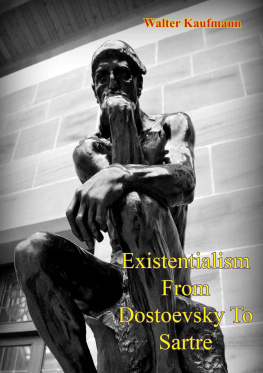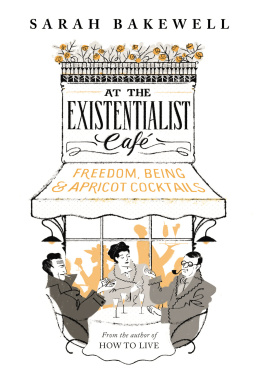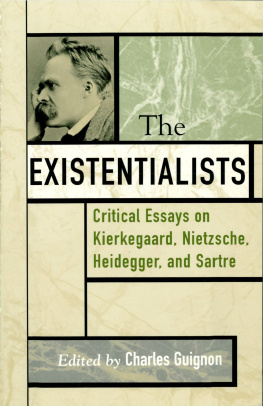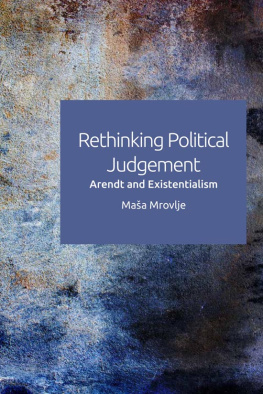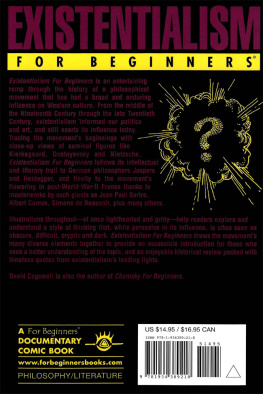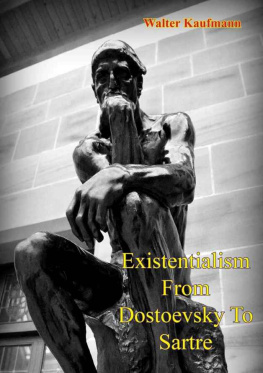Marino - Basic Writings of Existentialism
Here you can read online Marino - Basic Writings of Existentialism full text of the book (entire story) in english for free. Download pdf and epub, get meaning, cover and reviews about this ebook. City: New York, year: 2004;2007, publisher: Random House Publishing Group;Modern Library, genre: Science. Description of the work, (preface) as well as reviews are available. Best literature library LitArk.com created for fans of good reading and offers a wide selection of genres:
Romance novel
Science fiction
Adventure
Detective
Science
History
Home and family
Prose
Art
Politics
Computer
Non-fiction
Religion
Business
Children
Humor
Choose a favorite category and find really read worthwhile books. Enjoy immersion in the world of imagination, feel the emotions of the characters or learn something new for yourself, make an fascinating discovery.

- Book:Basic Writings of Existentialism
- Author:
- Publisher:Random House Publishing Group;Modern Library
- Genre:
- Year:2004;2007
- City:New York
- Rating:5 / 5
- Favourites:Add to favourites
- Your mark:
- 100
- 1
- 2
- 3
- 4
- 5
Basic Writings of Existentialism: summary, description and annotation
We offer to read an annotation, description, summary or preface (depends on what the author of the book "Basic Writings of Existentialism" wrote himself). If you haven't found the necessary information about the book — write in the comments, we will try to find it.
Marino: author's other books
Who wrote Basic Writings of Existentialism? Find out the surname, the name of the author of the book and a list of all author's works by series.
Basic Writings of Existentialism — read online for free the complete book (whole text) full work
Below is the text of the book, divided by pages. System saving the place of the last page read, allows you to conveniently read the book "Basic Writings of Existentialism" online for free, without having to search again every time where you left off. Put a bookmark, and you can go to the page where you finished reading at any time.
Font size:
Interval:
Bookmark:
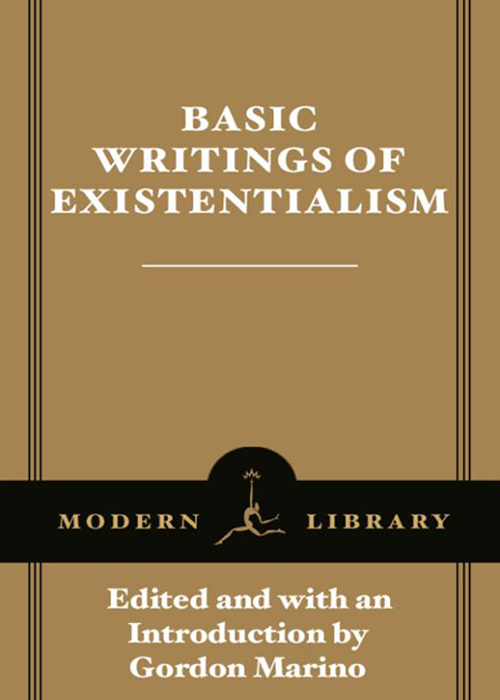
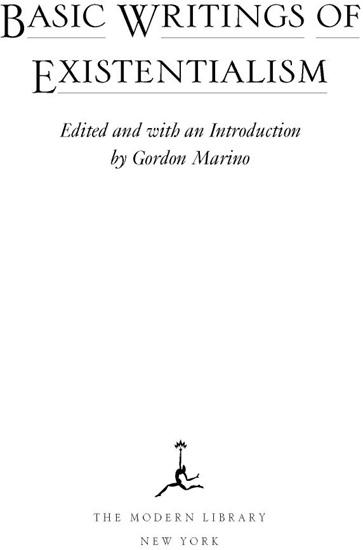
Table of Contents
TO SUSAN ELLIS MARINO, THE LOVE OF MY LIFE
PRAISE FOR BASIC WRITINGS OF EXISTENTIALISM
Basic Writings of Existentialism will be, for many, a reminder of what first drew them to existentialism and, simply, to philosophy. Marinos introductory essaystaut, instructive, well tuned to the drumbeat of each thinkers passions and concernsalong with the substantial selections from the foremost representatives of the movement, are a benediction. In defiance of Hegels pronouncements, the thinkers included here introduce us to a philosophy in present tense, and preferably in the active voice. Readers new to existentialism have as reliable a guide as the subject matter permits. Those familiar with movement have an occasion for recollection and more.
Vanessa Rumble, associate professor of philosophy, Boston College
This book is a perfect choice for all who wonder what existentialism is all about. The key writers are includedKierkegaard, Nietzsche, and Dostoevsky from the nineteenth century, and Heidegger, Sartre, and Camus from the twentieth century. Its good to see selections from Simone de Beauvoir and Ralph Ellison as well. Marino has a sharp eye for picking telling passages from often long and complex works. Its now clear that existentialism is one of the enduring traditions in Western philosophy, art, and religion, a perspective that articulates and responds to the deepest human needs. These fresh selections lay out the issues, from alienation to reconciliation, from despair to joyful wisdom, that make this world perspective so compelling. Marinos introductions to each writer, and his introductory overview, are lively and capture the spirit of the chosen texts. A profound adventure awaits those readers ready to immerse themselves in this jewel of a book.
Edward F. Mooney, professor of philosophy and religion, Syracuse University
ACKNOWLEDGMENTS
I would like to thank my friend David Possen for his sagacious advice on this volume. Gratitude is also due my editor, Evelyn OHara, for her patience and perspicuity.

INTRODUCTION
Gordon Marino
I came to existentialism on my knees, after a youthful divorce and in the cold grip of a withering depression. As a professor of philosophy, I realize that it is not fashionable and, philosophically speaking, almost vulgar to begin an anthology with a confession, but existentialism is a much more personal form of philosophizing than any other. In fact, some of the existential philosophers whom you will shake hands with in this book insist on working from the first-person perspective. And so I am within the tradition that I am presenting to confess that either by chance or grace, in the depths of a benumbing funk, I encountered the individual who is widely regarded as the father of existentialism, Sren Kierkegaard. I was in a used-book store, nervously flipping through texts, when I opened page one of Kierkegaards Works of Love:
If it were so, as conceited sagacity, proud of not being deceived, thinks, that we should believe nothing which we cannot see with our eyes, then first and foremost we ought to give up believing in love. If we were to do so and do it out of fear lest we be deceived, would we not then be deceived? We can, of course, be deceived in many ways. We can be deceived by believing what is untrue, but we certainly are also deceived by not believing what is true. We can be deceived by appearances, but we can also be deceived by shrewdness, by the flattering conceit which is absolutely certain it cannot be deceived. Which deception is more dangerous? Whose recovery is more doubtful, that of one who does not see, or that of the person who sees and yet does not see? What is more difficultto awaken someone who is sleeping or to awaken someone who awake, is dreaming that he is awake? Which is sadder, the sight that promptly and unconditionally moves one to tears, the sight of someone unhappily deceived in love, or the sight that in a certain sense could tempt laughter, the sight of the self-deceived, whose fatuous conceit of not being deceived would indeed be ridiculous and laughable if the ridiculousness of it were not an even stronger expression for horror, since it shows that he is unworthy of tears.
Today, orthodoxy has it that sudden psychological changes are chemical in nature, but there was a time when we still believed that an idea, or an interpretation of your experience, could turn the page of that experience. Kierkegaards Works of Love did that for me. In his Journals and Papers, Kierkegaard notes that there is nothing worse than thinking of your own emotional life as twaddle. And yet that is precisely how I felt on the long march under the black sun of depressionindifferent to almost everything, as though I had been struck by a meaningless kind of psychological leprosy. The famously depressive Dane went on to draw a distinction between despair and depression that has been paved over in the present age. While Kierkegaard would agree with modern psychology that depression is marked by inexplicable sadness and self-loathing, he explains that the depressed individual who is also in despair sees quite clearly that this depression... is of no great significance but precisely that fact, that it neither has nor acquires any great significance, is despair. And that is where I was calling from when Kierkegaard helped me to make the turn from thinking of suffering as a fever to regarding it as an action that could be carried out with dignity.
I was a graduate student in philosophy on leave from the university when I had this initial encounter with existentialism. It was the late seventies, a period in which most philosophy departments were controlled by the analytic tradition. Analytic philosophy placed great stress on clarity, precision, and logical form. Topics that could not be rigorously definedand that was just about everything meaningfulwere dismissed as pseudo-problems. Most philosophical talk during this era was about the way we talk. If you wanted to discuss the nature of the self you would first have to spend a couple of decades discussing the way we discuss the self, or so it seemed to me and many of my fellow students. It was, at the time, fashionable for analytic-type professors to begin a seminar by making a negative object lesson of one of the existentialists. The professor might read a line such as, The self is a relation that relates itself to itself and then chortle, Can you imagine anyone taking this gobbledygook for philosophy? Comically enough, the professor might then go on to passionately treat some trivial academic footnote battle for the remainder of the seminar. I went into philosophy smitten with Socrates and the fantasy that intellectual reflection might actually make an important difference in my life. After all, the word philosophy derives from the Greek expression for love of wisdom. But much of the academic philosophy that I was muddling through as a graduate student was bloodless and far removed from both experience and wisdom. Kierkegaard, however, flung open the window and convinced me that at least the existential movement resonated with the ancient view of philosophy as a way of life, as a guide for the perplexed.
Like some of the films that young people admire today and assimilate into their self-understanding, existentialism does not dodge the fact that there is something disturbing going on in the basement of our cozy middle-class world. While there is a long tradition in philosophy of believing that knowledge must be grounded in experience, existentialism tries to get at experience from the inside out. For instance, listen to the gears of Kierkegaards mind clicking in his philosophical magnum opus,
Next pageFont size:
Interval:
Bookmark:
Similar books «Basic Writings of Existentialism»
Look at similar books to Basic Writings of Existentialism. We have selected literature similar in name and meaning in the hope of providing readers with more options to find new, interesting, not yet read works.
Discussion, reviews of the book Basic Writings of Existentialism and just readers' own opinions. Leave your comments, write what you think about the work, its meaning or the main characters. Specify what exactly you liked and what you didn't like, and why you think so.


